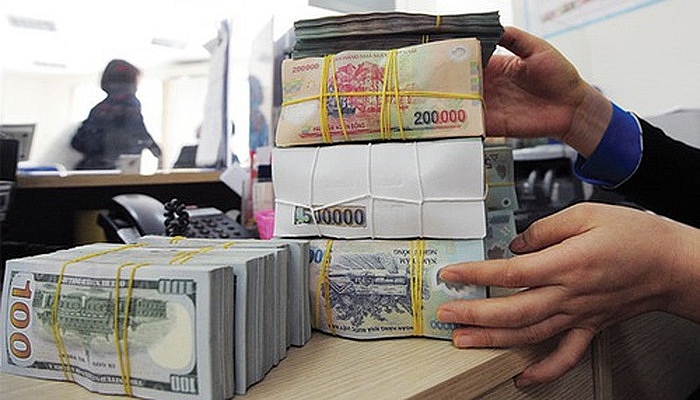Bad debts causing growing concerns to banks
 |
| The volume of bad debts at banks has been on the rise since the pandemic |
Nguyen Duc Thach Diem, CEO of Ho Chi Minh City-based commercial lender Sacombank, said that their non-performing loan (NPL) volume rose by VND712 billion ($30.96 million) by the end of the second quarter compared to early 2020 as many of their customers could not pay back due to the outbreak.
As of June 30, bad debts on their balance sheet were nearly VND6.682 trillion ($290.5 million), based on the bank’s first-half financial statement, nearly 17 per cent higher than at the beginning of the year when it was around VND950 billion ($41.3 million). Accordingly, Sacombank’s NPL ratio rose from 1.94 to 2.15 per cent.
The first-half financial statements of many banks reflect an uptrend in their bad debts, particularly regarding Group 3 to Group 5 loans (loans that are subprime to those facing the danger of being lost).
| Albeit banks have rescheduled loans for customers until end of September and the central bank is seeking comment for further support to the business community banks have growing concerns their NPL volume would further swell in the face of current COVID-19 complexity. |
Along with this, leading state-owned lender Vietcombank saw its bad debts jumping 11 per cent in the first half compared to early year, leading to a surge in its bad debts over total outstanding loans ratio from 0.79 to 0.83 per cent.
Similarly, by the end of June, total NPL volume at other big state-owned lender BIDV soared 17 per cent compared to the beginning of the year. Of this, the volume of subprime loans rose 11 per cent and loans at the risk of being lost jumped 17 per cent, pushing its bad debts ratio in total outstanding loans from 1.75 to 2 per cent.
The NPL ratio at another southern lender, ACB, expanded 32 per cent as of June 30 to touch VND1.918 trillion ($83.4 million), of which subprime loans swelled 48 per cent to VND348 billion ($15.1 million) and doubtful debts (Group 4) jumped 64 per cent, driving the bad debts ratio in total outstanding loans from 0.54 to 0.68 per cent.
Compared to the outset of 2020, total bad debts volume at Eximbank rose 12 per cent to surpass VND2.157 trillion ($93.8 million) by the end of the second quarter, of which Group 4 and 5 loans jumped 140 and 98 per cent, respectively.
This has resulted in its bad debts ratio surging from 1.71 to 2.08 per cent.
Bank executives said that the coronavirus pandemic has significantly hurt banking operations, causing bad debts to expand despite banks rescheduling loans by providing deadline extensions for borrowers hit by the pandemic in light of the State Bank of Vietnam’s Circular No.01/2020/TT-NHNN allowing banks to reschedule loans for customers affected by the health crisis.
Albeit banks have rescheduled loans for customers until the end of September and the central bank is seeking comments to amend Circular 01 to offer further support for the business community, banks have growing concerns that their NPL volume would swell further in the face of pandemic complexities.
CEO of private lender Viet Capital Bank (Ban Viet) Ngo Quang Trung said the bank is actively rescheduling loans for customers hit by the pandemic in parallel to keeping a close eye on controlling credit quality to mitigate the risk of bad debts.
Nguyen Canh Vinh, acting CEO of Eximbank forecast that the pandemic will force banks to increase provisioning which will in turn negatively affect the banks' profit picture.
This is clearly evidenced through banks’ – including Eximbank's – recent first-half financial statements as sharply-rising provisioning sums have put a dent in profit figures.
In light of Vietnam’s 2020 GDP growth scenario at an estimated 4 per cent, the ratio of bad debts on the balance sheet is forecast to touch 2.41 per cent by the end of the year. The SBV said that many countries have been executing diverse bailout packages to spur growth, reacting to the pandemic.
The timeline for a global bounceback remains uncertain, prompting international organisations to continue lowering global growth forecasts.
What the stars mean:
★ Poor ★ ★ Promising ★★★ Good ★★★★ Very good ★★★★★ Exceptional
Related Contents
Latest News
More News
- Cashless payments hit 28 times GDP in 2025 (February 04, 2026 | 18:09)
- SSIAM and DBJ launch Japan Vietnam Capital Fund (February 04, 2026 | 15:57)
- Banks target stronger profits, credit growth in 2026 (February 04, 2026 | 15:43)
- Vietnam on path to investment-grade rating (February 03, 2026 | 13:07)
- Consumer finance sector posts sharp profit growth (February 03, 2026 | 13:05)
- Insurance market building the next chapter of protection (February 02, 2026 | 11:16)
- NAB Innovation Centre underscores Vietnam’s appeal for tech investment (January 30, 2026 | 11:16)
- Vietnam strengthens public debt management with World Bank and IMF (January 30, 2026 | 11:00)
- Corporate bond market poised for stronger growth cycle (January 28, 2026 | 17:13)
- Vietnam's IPO market on recovery trajectory (January 28, 2026 | 17:04)

 Tag:
Tag:


























 Mobile Version
Mobile Version